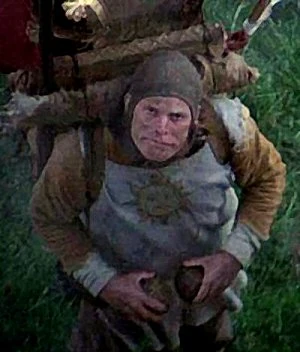Terry G
Terry Gilliam was always the odd man out in Monty Python--the only American amongst the Oxbridge crew, the animator versus the wordsmiths. And while all would carve out post-Python careers, probably none were as successful as Gilliam at creating a new identity beyond the troupe. And now Gilliam has a put out a memoir--Gilliamesque--to tell his story.
Much of it is about his early years--the book is almost half over before we get to Python. Gilliam, born in 1940, was raised in Minnesota and later California. He seems to have been an all-American boy--class president, straight A student, prom king. He was involved in the church, the scouts, sports, the military, etc. But he had a rebellious streak and throughout the 60s it came more and more into play.
He also had a talent for drawing and moved to New York, where he met his hero, the great cartoonist Harvey Kurtzman, and worked for Kurtzman's post-Mad Magazine project Help! In the late 60s, Gilliam moved (permanently) to England, where his animation got some attention and before you knew it he was one-sixth of the Monty Python troupe, whose TV show debuted in 1969.
Gilliam would occasionally act in the show, but his main job was to provide the animated bits that linked up otherwise unrelated sketches. As such, he was usually separate from the rest of the troupe, busy--with little time and even less money--working on his material. While he could draw, and was especially good at airbrushing, he realized he could work a lot quicker if he took pictures of older art and moved them around for his pieces.
The troupe made their first original film, Monty Python And The Holy Grail, and felt they should direct it as well. The job fell to the two Terrys, Gilliam and Jones. They had different approaches, as you might expect, with Gilliam emphasizing the look and style more than Jones--much to the frustration of the troupe members, who just wanted to do their lines and get their laughs. In fact, during an early preview, it was felt that Gilliam worked too hard on getting the sound effects and mood right, and not enough on the comedy.
But the bug had bit. Gilliam would continue to work with the troupe on various projects, but he wouldn't direct them any more. Instead, he'd go on to become a major director on his own projects. He's directed over ten features, including Time Bandits, Brazil, The Fisher King and Twelve Monkeys.
Much of the book deals with these various films. Not everything he made was great, and he's certainly had flops, but Gilliam has a distinctive style that makes even his minor films fascinating (if sometime almost incoherent).
Though he became a well-established filmmaker, working with major stars and big budgets, he never lost his rebellious streak. He turned down a lot of big money projects (the Python money--the rights to the TV show reverted to the troupe--helped pay the bills in-between projects) and always followed his own path.
As an artist, he seems instinctual. Not that he doesn't plan things out--a director is a general leading his troops into battle--but he seems to go more for a look and feeling than something more plotted from the start. And politically, while he may be a progressive, he's often quite reactionary--he seems to like much of what used to be, and distrusts the modern, rational world.
Other Pythons have written about their lives, and other people have written about the Pythons, but Gilliam's book adds a unique perspective that's worth adding to your bookshelf.





6 Comments:
I haven't seen Gilliam's haven't seen "Tideland" "The Zero Theorem," but the only film of his I wouldn't praise that I've seen is "Jabberwocky." What's your favorite, and should I try to see the two I've missed? My favorite may be "Baron Munchausen," though I'm sure the most popular of his fims must be "Brazil."
My favorites are probably Brazil and Munchausen, though neither were especially popular when released. Tideland and Zero Theorem are pretty obscure, and not the best place to start with him. His biggest hits were Time Bandits and 12 Monkeys. You also might want to check out Lost In La Mancha to see what he's like as a filmmaker and person.
What was wrong with Jabberwocky? It was a bit dark and disgusting but so are the best of the Python canon.
OK I probably haven't seen it since it came out when I was in high school but I still quote from it.
All characters portrayed in this film are entirely fictitious and bare no resemblance to anyone living or dead, except for one
Jabberwocky is like a Python movie without as many jokes or a lot of the cast. It's not bad, but it's no Holy Grail.
I don't hate Jabberwocky. I just don't praise it. My recollection is it was disjointed. In Holy Grail, Gilliam had Terry Jones to help organize what otherwise would have been an extended episode of Monty Python's Flying Circus. But Gilliam certainly became more proficient and a quite good, if unorthodox, story teller. Munchhausen, it seems to me, is a story about the power of story telling - Gilliam may have been working it out right then.
Post a Comment
<< Home